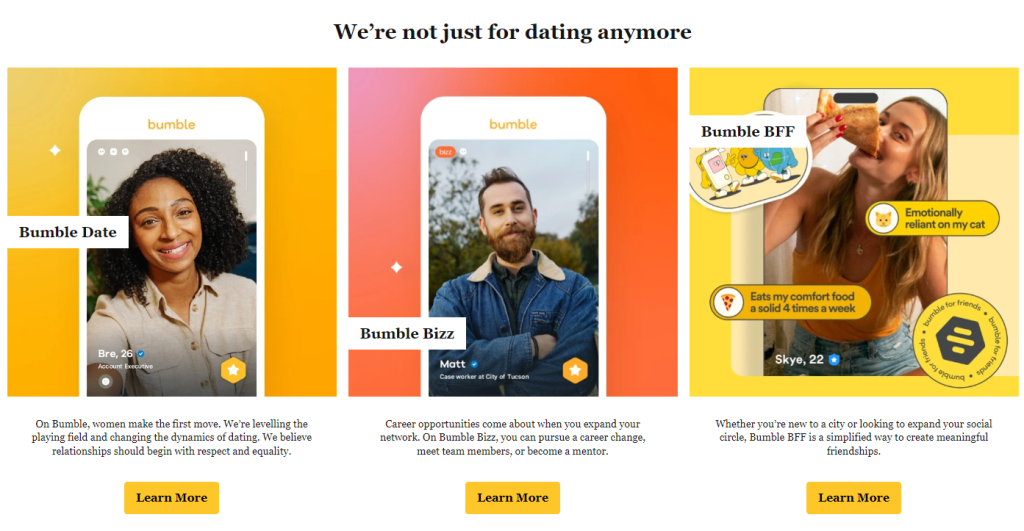Whitney Wolfe Herd is the visionary founder and CEO behind Bumble – one of the world’s most popular dating and networking apps. Her journey to create Bumble has been nothing short of remarkable, overcoming adversity and catalyzing an empowerment movement.
Background on Whitney Wolfe Herd
Whitney Wolfe Herd made waves in the tech world when she co-founded the female-focused dating app Bumble in 2014. However, her entrepreneurial journey began a few years earlier when she co-founded rival dating app Tinder while working at an LA startup incubator.
Wolfe Herd was born in Utah and attended Southern Methodist University in Texas, where she studied international studies. After college, she moved to Los Angeles and soon became part of the founding team behind Tinder.
However, her time at Tinder ended abruptly – she left the company and filed a lawsuit alleging sexual harassment and discrimination by her male cofounders. The case was settled out of court, but it marked a difficult chapter for Wolfe Herd.
Out of this adversity came opportunity. Wolfe Herd joined forces with Russian tech entrepreneur Andrey Andreev to launch Bumble as an app “by women, for women” where women make the first move in heterosexual matches. She drew on her painful experiences to build key safety features like photo verification into the platform.

“I experienced severe emotional abuse from my high school boyfriend during my really formative years, and it stripped me down to nothing,” Wolfe Herd has said. “It showed me a very dark side of relationships, and it helped inform my understanding of what was wrong with gender dynamics.”
The app was an overnight success. Today, Bumble has over 100 million users and has expanded beyond dating into friend-finding and career-networking verticals. The company went public in 2021 with Wolfe Herd at the helm, making her the youngest female founder to take a company public at age 31.
Outside of work, Wolfe Herd has a charmed life thanks to her marriage to Texas oil heir Michael Herd. The couple has two sons and splits their time between homes in Austin and Aspen.
Early Life and College
Born in 1989 in Salt Lake City, Utah, Wolfe Herd was raised in a traditional community by her property developer father and homemaker mother. According to childhood friends like Liddy Huntsman, Wolfe Herd endured an abusive relationship in high school that deeply impacted her, foreshadowing her future women’s advocacy.
After graduating, Wolfe Herd attended Southern Methodist University, joining the Kappa Kappa Gamma sorority. She made many connections during college that later proved invaluable for Bumble’s marketing and hiring.
Wolfe Herd also launched her first business venture at 19 – a tote bag nonprofit to fund Gulf oil spill relief efforts. She graduated in 2011 with an International Studies degree, intent on a marketing career.
Whitney Wolfe Herd’s Career
Whitney Wolfe Herd did not initially set out to become a tech entrepreneur. After briefly volunteering abroad after college, Wolfe Herd took a job in Los Angeles working for Hatch Labs, a startup incubator.
At Hatch Labs, she began collaborating after-hours with peers Sean Rad and Justin Mateen on a dating app called Tinder. With Wolfe Herd’s sorority-focused campus promotion strategy, Tinder exploded in popularity. She took on the Vice President of Marketing role as the app grew rapidly.
However, Wolfe Herd’s romantic involvement and subsequent breakup with Mateen led to a deterioration of her standing at the fledgling company. Harassment allegations surfaced before she eventually departed Tinder and filed a lawsuit. The legal battle and online backlash that followed left her depressed and paranoid.
The Genesis of Tinder
Initially hesitant to return to the dating industry after her Tinder tribulations, Wolfe Herd reconsidered an approach from Russian tech billionaire Andrey Andreev in 2014.
While she first envisioned creating a female-centric social media platform, Andreev persuaded her that transforming the concept into a dating app could empower women searching for love.
The resulting app would require women to make the first move after matching, subverting traditional dating dynamics where men lead. After just a few months of development, Bumble was born.
Scaling Up Bumble
Together with Andreev’s robust technological infrastructure and Wolfe Herd’s marketing prowess, Bumble expanded rapidly. She focused intensely on brand building, leveraging college sorority networks to stimulate viral adoption.
The fledgling company started with just a handful of employees crammed into a small Austin apartment.
Over the next few years, new functionalities expanded Bumble’s scope beyond dating into friendship and business networking verticals. The brand promoted female empowerment through various campaigns and public policy initiatives. By 2019, Bumble boasted over 55 million users globally.
There were growing pains in the early startup days regarding company culture, product quality, and accusations about the sexist environment enabled by Andreev at Badoo’s London office. However, under Wolfe Herd’s thoughtful leadership, Bumble managed through the turbulence to continued success.
What Makes Bumble Unique
Bumble stands out from other dating apps in a few key ways that align with Wolfe Herd’s vision for empowering women:
- Bumble requires women to make the first move after matching with men, giving women more control.
- The app focuses heavily on safety features and making women feel in charge.
- It aggressively moderates content to enforce standards of decency, aiming to make the internet “kinder.”

In 2021, at just 31 years old, Wolfe Herd took Bumble public on the NASDAQ stock exchange. She rang the bell holding her infant son, cementing her status as the youngest female founder to take a United States firm public.
While Bumble maintained steady growth in subsequent years, its share price sunk considerably from early highs. Persistent uncertainties also loomed around the sustainability of dating platforms hoping to spark relationships that reduce future revenue potential.
After almost a decade guiding Bumble, Wolfe Herd recently announced she will step down as CEO in 2023, shifting to an executive chairperson role while passing the reins to incoming CEO Lidiane Jones.
Her reasons for stepping back are unclear, though she had a baby last year and spoke of struggling to balance intense work demands with family life. At just 33 years old, her future plans and next steps remain undefined.
Wolfe Herd’s Vision and Leadership Style
True to her background in branding, Wolfe Herd views Bumble as a “lifestyle brand” aiming to empower women rather than merely a dating app.
- She draws inspiration from Disney in cultivating an emotional connection with customers that persists even when products falter.
- Wolfe Herd is deeply passionate about female empowerment and safety issues, having endured harassment herself. This informs Bumble’s ethos.
- She maintained a hands-on, detail-oriented leadership style even as Bumble scaled, weighing in on everything from HR disputes to ads.
- Her big-picture vision for improving behavior online coexists surprisingly well with near-fanatical attention to granular branding details – yellow and black color scheme, beehive aesthetic, playful puns.
This combination of strategic vision and zealous brand management makes Wolfe Herd a unique figure in the tech world. She aims to shake up online platforms as much as gender dynamics.

What Fuels Her Resilience?
When asked frequently about what motivates her in interviews, Wolfe Herd refers consistently to her sense of mission. She managed to transform personal hardships into a now-storied legacy.
Bumble brought tens of millions a safer, more supportive environment to potentially find companionship, intimacy, and professional growth. Beyond the valuation, stock price, and profits, Wolfe Herd views this social impact as her proudest win.
She once extolled “You have to show that if you get knocked off the horse, you get right back up.” This resilience and determination originate from her past experiences with adversity.
While soon relinquishing daily leadership duties, Wolfe Herd will remain devoted to progressing Bumble’s identity and purpose in her Executive Chair role.
Her Vision for the Future
Wolfe Herd believes technology should uphold ethical standards matching the physical world, not enable amplified harassment. Bumble set itself apart as a pioneer in leveraging AI, human moderators, and user-reporting to achieve safer digital interactions.
While critics highlight Wolfe Herd’s privilege and partnerships aiding Bumble’s early rise, she has undoubtedly championed tangible improvement around online welfare, particularly for marginalized groups.
As Wolfe Herd passes the CEO reins to Jones, her eyes are set on grander visions. She aims for Bumble to one day facilitate life’s essential relationships with the brand power of Disney itself. Through empathy, ethics, and comprehension of human connections, Wolfe Herd and Bumble will keep crafting a brighter digital future.
The road ahead will undoubtedly surface fresh challenges as the dating tech landscape shifts. But with Wolfe Herd’s resilient spirit aligned with Bumble’s mission, don’t bet against this visionary industry trailblazer changing the game once more.
Legacy of Whitney Wolfe Herd
As Bumble’s founder, Whitney Wolfe Herd utterly transformed the online dating game specifically and tech startup space broadly:
- She pioneered female-led dating apps and a women-first messaging model that other services soon copied.
- Wolfe Herd prioritized user security through moderation and identity verification years before it became standard.
- She broke barriers as a rare solo female tech startup founder, taking Bumble public and (briefly) becoming the world’s youngest woman self-made billionaire.
- In doing so, Wolfe Herd opened doors for the next generation of female startup leaders and served as a high-profile role model.
With courage and resilience, Wolfe Herd turned personal hardship into a mission to bring accountability, empowerment, and kindness – one connection at a time. Love her or hate her, she leaves behind an undeniably iconic tech legacy still being written.










Leave a Comment